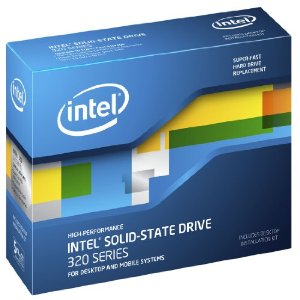Intel Releases New SSD Firmware to Fix 8 MB Bug
In July, we reported on a particularly nasty firmware bug that could reduce a new and shiny Intel 320 SSD, regardless of size, down to just 8MB.
Today, Intel posted a firmware fix that addresses the Bad Context 13x Error. Intel describes the error as:
For users unfamiliar with the issue, an Intel SSD 320 Series drive may exhibit a drive capacity of 8MB and an electronic serial # field containing a message of “BAD_CTX 0000013x” caused by an unexpected power loss under specific conditions. Once this error occurs, no data on the SSD can be accessed and the user cannot write to or read from the SSD.
For obvious reasons, Intel recommends that all users of the 320 Series of SSDs upgrade their firmware to the new version.
In order to provide the best user experience, Intel always recommends users download and install the latest firmware. As with any storage device, Intel recommends users frequently back up their data and periodically check for firmware updates. The Intel® SSD Toolbox provides a host of utilities to monitor your SSD, including displaying detailed information such as the currently installed firmware revision.
Get Tom's Hardware's best news and in-depth reviews, straight to your inbox.
-
jacobdrj Meh, 8MB is plenty of space for an OS drive and a few documents too...Reply
For like DOS...
This is the SECOND popular boo boo Intel has had with their SSDs. 1st was the BIOS 'Password' problem, and now the illustrious 8MB problem...
Kind of reminds me of the Pentium that couldn't do math back in the day... -
scook9 I have not had any issues yet with my 160GB 320 but this will definitely let me sleep better at night :DReply -
cadder Compare this with the failure rates for OCZ drives and Intel products will seem to be perfect.Reply
But you also wonder why a bug like this didn't come up during their product testing. -
bv90andy cadderCompare this with the failure rates for OCZ drives and Intel products will seem to be perfect.But you also wonder why a bug like this didn't come up during their product testing.That's because in testing they test a lot less devices then the number sold on the market. Seems pretty obvious. That's why there exist updates on everything, from cars to pc hardware to software.Reply -
tului I applied it last night to my 120GB drive. It's a small < 5MB ISO. I don't have anything of note on the drive so didn't back up, but it was non-destructive in my case.Reply -
subasteve5800 Didn't one of the editors (Crashman I think?) have this issue on one of their drives? I'd like to hear from them if this update fixed the problem.Reply -
lothdk Just applied it to my 160 GB drive, went fast and without any issues.Reply
Have to say, compared to what else we have seen, Intel have been quick to develop this firmware fix.

